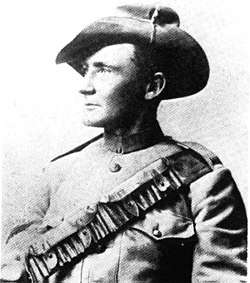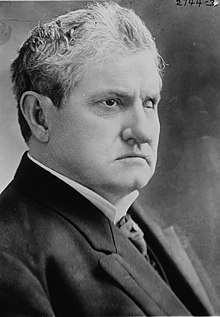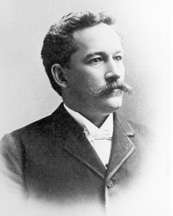February 1902
| << | February 1902 | >> | ||||
|---|---|---|---|---|---|---|
| Su | Mo | Tu | We | Th | Fr | Sa |
| 1 | ||||||
| 2 | 3 | 4 | 5 | 6 | 7 | 8 |
| 9 | 10 | 11 | 12 | 13 | 14 | 15 |
| 16 | 17 | 18 | 19 | 20 | 21 | 22 |
| 23 | 24 | 25 | 26 | 27 | 28 | |

February 27, 1902: Convicted war criminal Harry "Breaker" Morant hanged in Pretoria...
.jpeg)
... along with co-conspirator Peter Handcock
February 1, 1902 (Saturday)
- A gas explosion at a coal mine in Mexico killed over 100 miners [1]
- Born: Langston Hughes, African-American writer, in Joplin, Missouri (died 1967)
- Died: Salomon Jadassohn, 70, German composer and pianist
February 2, 1902 (Sunday)
- The first labor union in the Philippines, the Unión Obrera Democrática Filipina, was organized by Isabelo de los Reyes and Hermenegildo Cruz [2].
February 3, 1902 (Monday)
- The French ship Chanaral wrecked on the coast of Brittany, killing 21 people [1].
February 4, 1902 (Tuesday)
- Robert Falcon Scott and Ernest Shackleton made the first balloon flight in Antarctica, ascending to 800 feet (240 m) in a tethered hydrogen observation balloon, from which they took the first Antarctic aerial photographs.[3]
- Insurgent prisoners escaped Colombia's Fort Boca prison in Cartagena [1]
- Born:
- Charles Lindbergh, American aviator, in Detroit (died 1974)
- Hartley Shawcross, British barrister and politician, in Germany (died 2003)
February 5, 1902 (Wednesday)
- The French Chamber of Deputies approved a resolution to reduce the workload for coal miners to nine hours per day, approving it 338 to 219 [1]. Under the legislation, the workday would be 8 1/2 hours by 1904 and eight hours in 1906 [1].
- Born: Iwamoto Kaoru, Japanese professional Go player, in Masuda (died 1999)
February 6, 1902 (Thursday)
- Died: Clémence Royer, 71, French scholar and translator of Charles Darwin's On the Origin of Species.
February 7, 1902 (Friday)
- A new high speed railroad train was tested by the Pennsylvania Railroad. Averaging 67.5 miles per hour (108.6 km/h) the train covered the 90.2 miles (145.2 km) distance between New York City and Philadelphia in only one hour and 24 minutes [1].
- Canada's Justice Minister, David Mills, resigned to become a judge on the Supreme Court of Canada [1].
- Died: Thomas Sidney Cooper, 98, English landscape painter
February 8, 1902 (Saturday)
- Born: Demchugdongrub, Mongolian prince and politician, in Chahar Province (died 1966)
February 9, 1902 (Sunday)
- The South African Republic's General De Wet was able to escape through British lines back to safety [1].
- Fire leveled 26 city blocks of Paterson, New Jersey, after spreading from trolley car sheds, and destroyed 459 buildings, including churches, homes, offices, and the City Hall.[4]
- Four years after the end of the Spanish-American War, Spain's cabinet authorized its Foreign Minister, the Duke of Almodovar, to sign a treaty of friendship with the United States. [1]
February 10, 1902 (Monday)
- The British Government announced that it would not give up its concession in China's Wei-Hai-Wei, but pledged that it would withdraw troops [1].
- The City Savings Bank of Detroit failed [1].
- Born: Walter Houser Brattain, American physicist, Nobel Prize laureate, in Xiamen, China (died 1987)
February 11, 1902 (Tuesday)
- The United Kingdom announced the signing of a treaty of alliance with Japan, subject to approval of the parliaments of both empires, in order to preserve the integrity of China and Korea [1].
- Police and universal suffrage demonstrators fought in Brussels.
- Born: Arne Jacobsen, Danish architect and designer, in Copenhagen (died 1971)
February 12, 1902 (Wednesday)
- Hohenzollern, the personal yacht of Germany's Kaiser Wilhelm II arrived in New York City in advance of the arrival of Prince Henry. [1]
- Died: The Marquess of Dufferin, 75, British administrator who served as the third Governor General of Canada from 1872 to 1878, then as the Viceroy of India from 1884 to 1888
February 13, 1902 (Thursday)
- An earthquake of magnitude 6.9 struck in the Shamakhi District in Azerbaijan, reportedly killing 2,000 people and destroying 4,000 homes [5]. An official report listed only 86 deaths despite the destruction of over 3,000 homes.[6]
- The 1902 World Figure Skating Championships took place in London. Only four skaters participated in the singles competition, which was won by Ulrich Salchow of Sweden.[7]
- Died: Robert Burns Lindsay, 77, Scottish-born American politician who served as Governor of Alabama during the Reconstruction Era from 1870 to 1872.
February 14, 1902 (Friday)
- Born: Thelma Ritter, American actress, in New York City (died 1969)
- Died: James Bradley Thayer, 71, American law professor and authority on constitutional law
February 15, 1902 (Saturday)
- The Stammstrecke" route of the Berlin U-Bahn underground transport system was opened, and immediately became popular.[8]
- Died:
- Viggo Hørup, 60, Danish liberal politician and journalist who inspired Denmark's Radikale Venstre (the Radical Left or Social Liberal Party); from cancer. In 1909, Carl Theodor Zahle would become the first Radical Left Prime Minister of Denmark
- William H. West, 45, white American entertainer who managed a minstrel show using African American performers rather than white performers in blackface; from cancer
February 16, 1902 (Sunday)
- Died: George Carter Needham, 56, American evangelist whose name was applied by a candy manufacturer to a popular confectionery bar in the 19th century
February 17, 1902 (Monday)
- The U.S. Senate voted to ratify the purchase by the United States from Denmark of the Danish West Indies, now the U.S. Virgin Islands. [5]
- In the Bulgarian parliamentary election, the Progressive Liberal Party won 89 of the 189 seats.[9]
February 18, 1902 (Tuesday)
- U.S. President Theodore Roosevelt prosecuted the Northern Securities Company for violation of the Sherman Act.
- The first performance of Jules Massenet's opera Le jongleur de Notre-Dame took place at the Opéra Garnier in Monte Carlo.[10]
- In elections in the U.S. city of Pittsburgh, Pennsylvania, the new Citizens' Party defeated several incumbent city councilmen and the city's comptroller [5].
- Died:
- Charles L. Tiffany, 90, American jewelry merchant who founded Tiffany & Co.
- Albert Bierstadt, 72, German-born American landscape painter
- Marcellin Desboutin, 79, French portrait painter
- Reverend Newman Hall, 85, British Anglican bishop and author of the 1848 bestseller Come to Jesus
- Neville Bowles Chamberlain, 82, British Army field marshal
February 19, 1902 (Wednesday)
- France and Venezuela resumed diplomatic relations, seven years after breking off contact in 1895 [5].
- U.S. President Roosevelt rejected the appeal of Admiral Schley from the unfavorable decision of the U.S. Navy Board of Inquiry [5].
- Born:
- Kay Boyle, American writer (d. 1992)
- Eddie Peabody, American musician (d. 1970)
- Died:
- Richard Maurice Bucke, 64, Canadian psychiatrist, known for his 1901 book Cosmic Consciousness and his theory that human beings could obtain a higher form of consciousness. Bucke suffered a fatal head injury after slipping and falling on a patch of ice at his home.
- Thomas F. Toon, 61, American educator and former Confederate general during the American Civil War.
February 20, 1902 (Thursday)
- The largest ocean liner built in the United States, SS Kroonland, was launched in Philadelphia after being constructed for J. P. Morgan's International Mercantile Marine line [5].
- The Empress Dowager of China and the young Emperor gave private audiences to the new foreign representatives who had arrived at the Forbidden City of Beijing [5].
- Born: Ansel Adams, American photographer (d. 1984)
February 21, 1902 (Friday)
- A week of labor riots in Barcelona was finally brought to an end, but only after 50 people had been killed in the violence [5].
- Died:
- Emil Holub, 54, Bohemian Czech explorer in Africa; from malaria
- William S. Stokley, 78, American politician known for his corruption as Mayor of Philadelphia, Pennsylvania.
February 22, 1902 (Saturday)

Senator Tillman

Senator McLaurin
- The two U.S. Senators from South Carolina, Benjamin Tillman and John L. McLaurin, got into a fistfight during a heated debate while the Senate was in session. According to the New York Times, "Mr. Tillman charged his colleague with succumbing to improper influences" when the peace treaty with Spain (to end the Spanish-American War) was before the Senate... Mr. McLaurin called Mr. Tillman a liar. Then came a blow from Mr. Tillman, a counter-blow from Mr. McLaurin, a clinch, and a series of wild punches."[11]
- Seventeen people were killed in a fire at the Park Avenue Hotel in New York City [12]
- The 1902 British Home Championship soccer tournament began in Cardiff, with Ireland defeating Wales, 3–0.[13]
- Died: Rebecca Foster, 53, American missionary and prison relief worker known as "The Tombs Angel"; she was one of the victims of the Park Avenue Hotel fire
February 23, 1902 (Sunday)
- Prince Henry of Prussia arrived in New York Harbor aboard the ship Kronprinz Wilhelm [14].
- American Protestant missionary Ellen M. Stone and her fellow missionary, Katerina Stefanova Tsilka, were released by Bulgarian rebels in the Ottoman Empire, more than five months after they had been kidnapped on September 3, 1901 [15]. Miss Tsilka, who was pregnant at the time the two women were taken captive near Bansko, gave birth to a daughter while being held for ransom. The three arrived in Strumica at 3 o'clock in the morning. Miss Stone then proceeded to Salonika.
February 24, 1902 (Monday)
- Tomás Estrada Palma was formally selected as the first President of Cuba by the Cuban Electoral College, and Luis Estévez was approved as the first Vice President. [5]
- The French Chamber of Deputies voted to approve a resolution requiring two years compulsory military service for adult men [5].
- U.S. President Theodore Roosevelt hosted Prince Henry of Prussia at dinner at the White House. The two men traveled together to New York by railroad the next day [1].
- The British post-office telephone system was inaugurated, giving access to telephone service for paying British customers [5].
- The maximum salary of rural free delivery letter carriers was raised from $500 per year to $600 per year by the U.S. Postmaster-General [5].
February 25, 1902 (Tuesday)
- Meteor III, the world's largest yacht, was launched from the shipyard at Shooters Island, where it had been constructed at the direction of Germany's Kaiser Wilhelm II. Having recently celebrated her 18th birthday, Alice Roosevelt, the daughter of U.S. President Roosevelt, was given the honor of christening the ship in the presence of Prince Henry [5].
- The British sailing ship Liverpool, en route from Antwerp to San Francisco, hits rocks at Hommeaux Florains, on Alderney in the Channel Islands, in fog. All on board survive the incident.[16][17]
- Died: John B. Sherman, 77, American businessman who founded Chicago's Union Stock Yards
February 26, 1902 (Wednesday)
- The centennial of the birth of Victor Hugo was celebrated in France with the dedication of a monument at his birthplace at Besançon [5].
- In the North Kilkenny by-election, brought about by the resignation of the sitting MP Patrick McDermott of the Irish Parliamentary Party, Joseph Devlin stands unopposed and retains the seat on behalf of the IPP.
- Died:
- Jerome Wheelock, 67, American inventor
- Henry Marquand, 81, American philanthropist and president of the Metropolitan Museum of Art
February 27, 1902 (Thursday)
- The Congress of Venezuela voted to approve the re-election of President Cipriano Castro [5].
- Born:
- Gene Sarazen, American golfer, in Harrison, New York (died 1999)
- John Steinbeck, American novelist, in Salinas, California (died 1968)
- Died: Harry "Breaker" Morant, 37, English-born Australian soldier, and his Australian-born comrade Peter Handcock, 44, were executed for their part in revenge killings against Boer prisoners of war and civilians in Northern Transvaal, during the Second Boer War.[18]
February 28, 1902 (Friday)
- The U.S. Senate voted to censure Senators Tillman and McLaurin.
- Born: Marcela Paz, Chilean writer, in Santiago (died 1985)
gollark: Most bots and bot libraries just *deliberately ignore* others.
gollark: No.
gollark: What did the bots do? Surely they could be made to just not interact with each other constantly.
gollark: A highlight feature could be helpful.
gollark: I can make *my* bot open bidirectional communication links to any channel I have the ID of (which it's in) but I never needed to do this.
References
- The American Monthly Review of Reviews (March, 1902), pp. 281-285
- Alfredo B. Saulo, Communism in the Philippines: An Introduction (Ateneo de Manila University Press, 2002) p6
- Preston, Diana (1999). A First Rate Tragedy: Captain Scott's Antarctic Expeditions (paperback ed.). London: Constable. pp. 45–46. ISBN 0-09-479530-4. OCLC 59395617.
- "The Fire of 1902". A history of Paterson, NJ. Retrieved 24 January 2017.
- The American Monthly Review of Reviews (April, 1902), pp. 410-413
- "19020213 AZERBAIJAN: SEMACHA; N IRAN". National Geophysical Data Center. February 13, 1902. Retrieved November 16, 2015.
- Absaliamova, I. V. (1997). Stletniaya Istoria Chempionatov Mira po Figurnomu Kataniu na Konkach (Odinochnoe Katanie) (in Russian). Moscow: FON. p. 122. ISBN 5-89022-046-2.
- Brian Hardy: The Berlin U-Bahn, Capital Transport, 1996, ISBN 1-85414-184-8
- Nohlen, D & Stöver, P (2010) Elections in Europe: A data handbook, p368 ISBN 978-3-8329-5609-7
- Milnes R. Le jongleur de Notre-Dame. In: The New Grove Dictionary of Opera. Macmillan, London and New York, 1997.
- "Senators Fight on Senate Floor", New York Times, February 23, 1902, p1
- "Seventeen Dead in Hotel Horror", New York Times, February 23, 1902, p1
- Guy Oliver (1992). The Guinness Record of World Soccer. Guinness. ISBN 0-85112-954-4.
- "Prince Henry Now the Country's Guest", New York Times, February 24, 1902, p1
- "Miss Stone Free at Last— She Reached Strumitsa, Macedonia Yesterday, New York Times, February 24, 1902, p1"
- "sv Liverpool". Archived from the original on 2011-12-15.CS1 maint: unfit url (link)
- John Elsbury. "SHIPWRECKS NEAR ALDERNEY".
- Davey, Arthur (1987). Breaker Morant and the Bushveldt Carbineers, Second series no 18, Van Riebeeck Society, Cape Town.
This article is issued from Wikipedia. The text is licensed under Creative Commons - Attribution - Sharealike. Additional terms may apply for the media files.